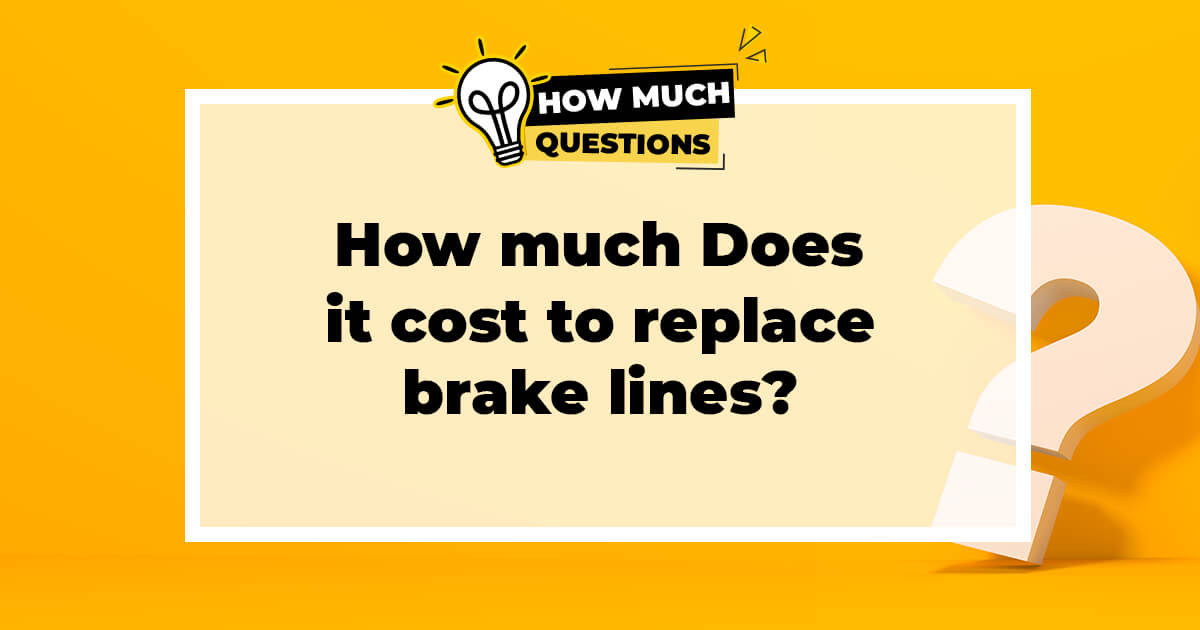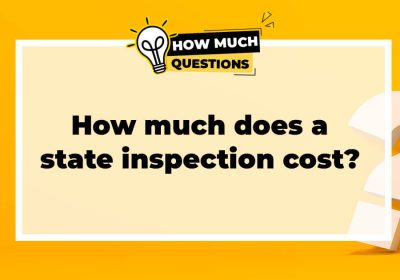
How much does it cost to replace brake lines?
Discover the factors influencing the cost of replacing brake lines and get expert tips to save money during the process.

Introduction
When your vehicle's brake lines start showing signs of wear and tear, it's crucial to address the issue promptly to ensure your safety on the road. However, one common concern that many car owners have is the cost associated with replacing brake lines. In this comprehensive guide, we will delve into the various factors that influence the cost of brake line replacement. We'll also provide you with essential pre-purchase considerations, cost-saving tips, and guidance to help you make optimal choices. By the end of this article, you'll have a clear understanding of what to expect and how to save money while ensuring your brakes are in top-notch condition.
How Much Does It Cost to Replace Brake Lines?
The cost to replace brake lines varies based on several factors, including the make and model of the vehicle, the type of brake lines (steel or rubber), labor rates in your area, and whether you're replacing a section or the entire line. On average:
- Steel brake lines: $300 to $1,000
- Rubber brake lines: $100 to $300
It's essential to note that these are general estimates. For an accurate quote, consult a local auto repair shop. Regularly inspecting and maintaining your brake lines can prevent unexpected expenses and ensure road safety.
Factors Influencing Cost
1. Brake Line Material
The type of material used for your brake lines plays a significant role in determining the overall cost. Common materials include:
- Steel: Durable and affordable.
- Copper/Nickel Alloy: Offers corrosion resistance.
- Stainless Steel: Provides excellent corrosion resistance but is more expensive.
- Polytetrafluoroethylene (PTFE): High-performance option but comes at a premium price.
We will discuss each material's advantages and disadvantages, helping you make an informed choice.
2. Vehicle Make and Model
Different vehicles have varying brake line configurations, making replacement more complex for some. Luxury or high-performance cars may require specialized parts, increasing the cost. We'll explore how your vehicle type affects the overall expense.
3. Brake Line Length
The length of the brake lines needed for your vehicle can significantly impact the cost. Longer lines mean more materials and labor. We'll provide guidance on how to estimate the required length accurately.
4. Labor Costs
Labor charges for replacing brake lines can vary depending on your location and the mechanic's expertise. We'll discuss average labor rates and provide tips for finding affordable yet skilled professionals.
5. Additional Parts and Components
Sometimes, replacing brake lines may involve replacing other components like brake hoses, fittings, or calipers. We'll explain how these additional parts can affect the overall cost.
Pre-Purchase Considerations
Before you decide to replace your brake lines, consider the following:
1. Inspection by a Professional
Always start with a professional inspection. They can assess the condition of your brake lines and advise on the necessity of replacement.
2. Budget Planning
Determine your budget and be prepared for potential additional costs. Knowing your financial boundaries will help you make informed decisions.
3. Research Mechanics
Look for experienced and reputable mechanics or auto shops. Don't hesitate to ask for quotes and compare prices to get the best deal without compromising on quality.
Cost-Saving Tips
To help you save money during the brake line replacement process, consider these tips:
- DIY vs. Professional Installation: Assess your skills and the complexity of the job. Some car owners with mechanical aptitude may opt for DIY installation to save on labor costs, but be sure you're comfortable with the task.
- Buy Quality Materials: While it's tempting to choose the cheapest materials, investing in high-quality brake lines can save you money in the long run by extending their lifespan.
- Regular Maintenance: Proper maintenance can prevent premature brake line damage. Regularly check for signs of wear and rust, and address issues promptly.
Guidance for Optimal Choices
In summary, prioritize safety and quality when considering brake line replacement. Always seek professional advice if you're unsure about any aspect of the process. By choosing the right materials, mechanics, and maintenance routines, you can ensure your brakes remain reliable and cost-effective over time.
Conclusion
Replacing brake lines is a crucial aspect of vehicle maintenance, and understanding the factors influencing the cost is essential. We've explored the materials, vehicle-specific factors, labor costs, additional components, pre-purchase considerations, and cost-saving tips to help you navigate this process successfully.
Remember, your safety on the road is paramount. If you're uncertain about any aspect of brake line replacement, consult a professional mechanic. Feel free to leave your questions or comments below, and we'll be happy to assist you. Keep in mind that the information provided in this article is for informational purposes only, and seeking professional advice is highly recommended for any automotive repairs or maintenance tasks.
FAQ: Frequently Asked Questions
How much does it cost to replace brake lines?
The cost of replacing brake lines varies based on several factors, including the make and model of the vehicle, the type of brake lines (steel or rubber), and labor rates in your area. On average, the cost ranges from $100 to $1,000. It's essential to consult a local auto repair shop for an accurate quote.
What are brake lines?
Brake lines are reinforced tubes that transport brake fluid from the master cylinder to the brake calipers or drums. They play a crucial role in the braking system, ensuring that the brakes function correctly when the pedal is pressed.
How often should brake lines be replaced?
Most brake lines need replacement around 100,000 miles. However, it's vital to inspect them regularly for signs of wear, corrosion, or damage. If you notice any issues, it's recommended to replace them immediately to ensure road safety.
What factors affect the cost of brake line replacement?
The cost can be influenced by the vehicle's make and model, the type of brake lines, labor rates in the area, and whether you're replacing a section or the entire line. Additionally, the quality of the replacement parts and any related repairs or maintenance can also impact the price.
Are there different types of brake lines?
Yes, there are primarily two types of brake lines: steel and rubber. Steel brake lines are more durable and resistant to wear, while rubber brake lines are flexible and easier to install. The type of brake line and its location on the vehicle can affect the replacement cost.
How can I maintain my brake lines?
Regular inspections are crucial. Check for signs of wear, corrosion, or damage. Avoid driving in conditions that can cause excessive wear, such as on salted roads. Also, ensure that the brake fluid is changed at recommended intervals to prevent corrosion from the inside.
Can I replace brake lines myself?
While it's possible for individuals with mechanical experience to replace brake lines, it's a task that requires precision and care. If not done correctly, it can compromise the vehicle's safety. If you're unsure, it's best to consult a professional.
What are the signs of a faulty brake line?
Symptoms of a faulty brake line include a spongy brake pedal, visible fluid leaks near the wheels, reduced braking efficiency, and the presence of rust or corrosion on the lines.
Is it dangerous to drive with damaged brake lines?
Yes, driving with damaged or faulty brake lines is hazardous. It can lead to brake failure, putting the driver and other road users at risk. If you suspect an issue with your brake lines, it's essential to address it immediately.
How long does it take to replace brake lines?
The duration can vary based on the vehicle and the extent of the replacement. On average, it can take anywhere from 2 to 4 hours. However, it's best to check with a local mechanic for a more accurate estimate.
 How much does it cost to remove window tint?
How much does it cost to remove window tint? How much does it cost to build a car?
How much does it cost to build a car? How much does it cost to replace a control arm?
How much does it cost to replace a control arm?If you want to know other articles similar to How much does it cost to replace brake lines? you can visit the category Automotive Costs and Repairs.
- Introduction
- How Much Does It Cost to Replace Brake Lines?
- Factors Influencing Cost
- Pre-Purchase Considerations
- Cost-Saving Tips
- Guidance for Optimal Choices
- Conclusion
- FAQ: Frequently Asked Questions
- How much does it cost to replace brake lines?
- What are brake lines?
- How often should brake lines be replaced?
- What factors affect the cost of brake line replacement?
- Are there different types of brake lines?
- How can I maintain my brake lines?
- Can I replace brake lines myself?
- What are the signs of a faulty brake line?
- Is it dangerous to drive with damaged brake lines?
- How long does it take to replace brake lines?
Leave a Reply







You might be interested in